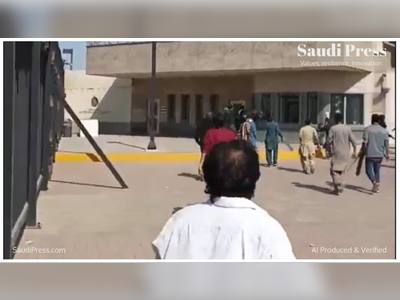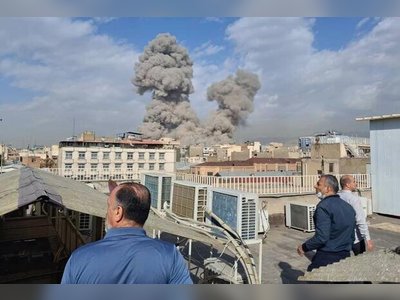0:00
0:00
Saudi Finance Minister Highlights $600 Billion Investment in U.S. and Vision 2030 at Davos 2025
Saudi Arabia's strategic economic initiatives aim to balance global investments and domestic transformation under Vision 2030.
Speaking at the Davos 2025 summit, Saudi Arabia’s Finance Minister Mohammed Al-Jadaan discussed the country’s ambitious economic strategies, highlighting a proposed $600 billion investment in the U.S. over the next four years.
This pledge was reportedly conveyed during a recent conversation between Saudi Crown Prince Mohammed bin Salman and U.S. President Donald Trump.
Al-Jadaan emphasized the historic partnership between Saudi Arabia and the U.S., which spans over eight decades and includes $770 billion in existing investments.
The proposed funding will combine investments and procurement, demonstrating Saudi Arabia’s confidence in the strength of the U.S. economy under its new administration.
As part of its Vision 2030 initiative, Saudi Arabia aims to diversify its economy beyond oil dependence.
Al-Jadaan noted that the country’s non-oil GDP now accounts for 52% of the total economy, with private sector investment rising from 17% to 24% of GDP. These figures indicate significant progress toward decoupling Saudi Arabia’s economy from the volatility of oil markets.
Regarding funding for large-scale projects, including the World Cup and other megaprojects, the finance minister stated that Saudi Arabia has implemented a long-term fiscal plan to balance spending and private sector growth.
He underscored the importance of prioritizing projects to avoid economic overheating and to ensure that local industries benefit from development initiatives.
On the question of further sales of Saudi Aramco stakes, Al-Jadaan confirmed that such actions are part of a broader long-term strategy initiated in 2016 but did not indicate any immediate plans for additional sales.
Al-Jadaan also addressed concerns about oil production cuts, which have affected Saudi GDP growth forecasts.
He reiterated that Vision 2030’s focus on non-oil economic growth ensures resilience against fluctuations in oil production.
Saudi Arabia’s private sector confidence, business investment, and consumer activity remain robust, reflecting the success of these reforms.
When asked about attracting foreign direct investment (FDI), Al-Jadaan stressed the importance of building investor confidence domestically.
He noted that Saudi Arabia has consistently exceeded targets set under its National Investment Strategy, fostering opportunities for both local and international investors.
With its comprehensive reforms and strategic investments, Saudi Arabia continues to position itself as a key player in the global economy, leveraging its Vision 2030 framework to achieve sustainable growth and economic diversification.
This pledge was reportedly conveyed during a recent conversation between Saudi Crown Prince Mohammed bin Salman and U.S. President Donald Trump.
Al-Jadaan emphasized the historic partnership between Saudi Arabia and the U.S., which spans over eight decades and includes $770 billion in existing investments.
The proposed funding will combine investments and procurement, demonstrating Saudi Arabia’s confidence in the strength of the U.S. economy under its new administration.
As part of its Vision 2030 initiative, Saudi Arabia aims to diversify its economy beyond oil dependence.
Al-Jadaan noted that the country’s non-oil GDP now accounts for 52% of the total economy, with private sector investment rising from 17% to 24% of GDP. These figures indicate significant progress toward decoupling Saudi Arabia’s economy from the volatility of oil markets.
Regarding funding for large-scale projects, including the World Cup and other megaprojects, the finance minister stated that Saudi Arabia has implemented a long-term fiscal plan to balance spending and private sector growth.
He underscored the importance of prioritizing projects to avoid economic overheating and to ensure that local industries benefit from development initiatives.
On the question of further sales of Saudi Aramco stakes, Al-Jadaan confirmed that such actions are part of a broader long-term strategy initiated in 2016 but did not indicate any immediate plans for additional sales.
Al-Jadaan also addressed concerns about oil production cuts, which have affected Saudi GDP growth forecasts.
He reiterated that Vision 2030’s focus on non-oil economic growth ensures resilience against fluctuations in oil production.
Saudi Arabia’s private sector confidence, business investment, and consumer activity remain robust, reflecting the success of these reforms.
When asked about attracting foreign direct investment (FDI), Al-Jadaan stressed the importance of building investor confidence domestically.
He noted that Saudi Arabia has consistently exceeded targets set under its National Investment Strategy, fostering opportunities for both local and international investors.
With its comprehensive reforms and strategic investments, Saudi Arabia continues to position itself as a key player in the global economy, leveraging its Vision 2030 framework to achieve sustainable growth and economic diversification.











